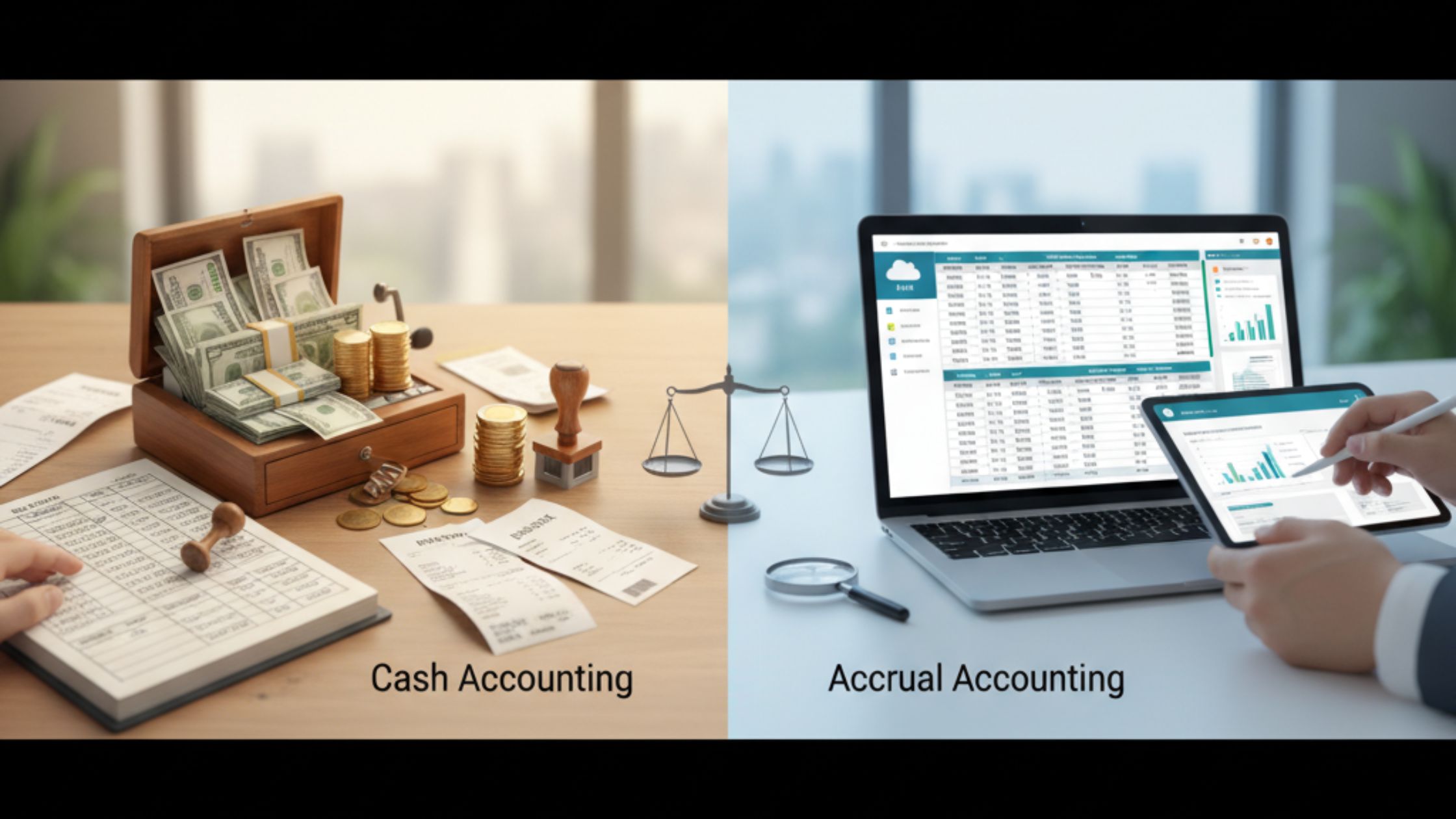Running a small business means making smart decisions about how you manage money. One of the most important decisions is whether to use cash accounting or accrual accounting. This choice affects how you track revenue, expenses, and ultimately how you understand the financial health of your business.
In this guide, we’ll break down both methods in plain language, answer the most common questions, and show when each method makes sense.
What Is Cash Accounting?
Cash accounting is simple: you record income when money actually comes in and record expenses when you actually pay them.
For example, if you send an invoice in May but don’t get paid until June, you only count the revenue in June under cash accounting.
Cash accounting records transactions only when money changes hands.
What Is Accrual Accounting?
Accrual accounting records income and expenses when they’re earned or incurred, not when cash moves.
Using the same example: if you send an invoice in May, you record it as May revenue, even if the customer pays in June.
Accrual accounting matches income and expenses to the period they belong to, regardless of payment date.
Key Differences at a Glance
| Feature | Cash Accounting | Accrual Accounting |
| Timing | Record when cash changes hands | Record when earned or incurred |
| Complexity | Easier to manage | More detailed, requires adjustments |
| Best For | Small businesses, freelancers, sole proprietors | Growing businesses, those with inventory or credit |
| Tax Filing | Simple, fewer adjustments | More complex but more accurate long-term |
Which Method Do Small Businesses Commonly Use?
Most very small businesses, freelancers, and contractors start with cash accounting because it’s straightforward. Once a business grows, has inventory, or deals with complex credit terms, accrual accounting often becomes necessary.
In fact, the IRS requires accrual accounting for businesses with inventory and annual sales above $25 million.
Pros and Cons of Cash Accounting
Advantages
- Easy to understand and manage.
- Shows actual cash on hand.
- Lower bookkeeping costs in early stages.
Disadvantages
- Doesn’t give a full picture of long-term financial health.
- Can distort profit when invoices are delayed.
- Less suitable for scaling businesses.
Pros and Cons of Accrual Accounting
Advantages
- Matches revenue and expenses to the right period.
- Provides a clearer long-term financial picture.
- Preferred by lenders and investors.
Disadvantages
- More complex and requires adjustments.
- Cash flow can be harder to track directly.
- Usually needs professional bookkeeping services for accuracy.
Cash vs. Accrual: Which Is Better for Taxes?
Cash accounting often reduces tax burden for small businesses because you only report income when you receive it. Accruals may show higher taxable income because it records money you haven’t collected yet.
However, accrual is more accepted by banks and investors, and sometimes the IRS requires it.
Can a Business Switch from Cash to Accrual?
Yes, businesses can switch but you must file Form 3115 with the IRS to change accounting methods. Many companies move from cash to accrual as they grow, especially when managing inventory or seeking financing.
Do Startups Need Accrual Accounting?
Not always. Startups with simple operations and minimal overhead often use cash. Once they attract investors or manage more complex revenue streams, accrual becomes the smarter option.
Common Questions Small Business Owners Ask
1. Is accrual accounting more accurate?
Yes. It aligns income and expenses with the correct time periods, which is why lenders and investors trust it more.
2. Can I use both cash and accrual methods?
You must pick one for tax reporting, but many businesses use a hybrid approach for internal management.
3. Which industries must use accrual?
Any business with inventory, larger corporations, and those exceeding $25 million in annual sales.
4. What happens if I choose the wrong method?
You may misrepresent profits, face tax compliance issues, or struggle with cash flow management.
How Professional Bookkeepers Can Help
Choosing between cash and accrual is just the first step. Managing it properly requires accuracy, consistency, and compliance with tax rules. That’s where professional help comes in.
At Smart Accountants, we provide end-to-end bookkeeping services that cover both cash and accrual accounting. Our team ensures your books are accurate, tax-ready, and designed to help you make smart decisions.
Local Expertise Matters
If you’re running a business in the Northeast, we also serve multiple local communities. Whether you need bookkeeping setup, cleanup, or ongoing support, our team has you covered in:
- Bookkeeping services Stamford CT
- Bookkeeping service in NYC
- Bookkeepers in Milford CT
- Bookkeepers in Bridgeport
- Bookkeepers in New Haven
- Bookkeepers in White Plains NY
- Bookkeepers in Fairfield CT
- Bookkeeper Long Island NY
- Bookkeepers in Westport CT
- Bookkeeping Shelton CT
Final Thoughts
Cash vs. accrual accounting isn’t just an accounting choice, it shapes how you see your business’s financial health.
- If you’re small and want simplicity, cash works well.
- If you’re growing, managing inventory, or want a full financial picture, accrual is the better fit.
Either way, having a professional bookkeeper ensures your method is applied correctly, your records are compliant, and your time is freed up to focus on running your business.
FAQS
Q: What’s the simplest accounting method for small businesses?
Cash accounting is the simplest because it records income and expenses only when money moves.
Q: Why do lenders prefer accrual accounting?
Because it shows a clearer, more consistent picture of profitability and obligations.
Q: Can a small business save money on taxes by using cash accounting?
Often yes, because you don’t report unpaid invoices as income.
Q: What’s the main drawback of accrual accounting?
It’s more complex and may not reflect actual cash flow.






